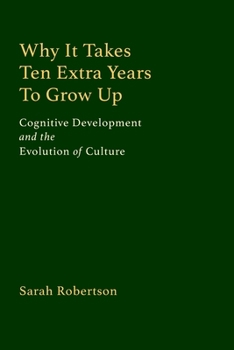Why It Takes Ten Extra Years To Grow Up: Cognitive Development and the Evolution of Culture
It takes ten extra years or so to grow up these days. Many people in their twenties postpone adulthood for some time, while midlifers sometimes step away from their adult social roles for a while to revisit issues they may have abandoned in their youth. This is the sort of thing that happens every time a culture makes a radical shift in its way of thinking. We don't know what happened when humans first started talking, and we don't know much about how literacy in the classical era affected young people, but we know that teens in the Renaissance in Europe, during a period when Europe was making a shift from semiliteracy to full literacy, behaved very similarly to twenty-somethings today-many of them went on walkabout, drifted from school to school, moved away from home, moved back in with parents, and postponed taking on an adult social role for up to a decade or more. Only they were ten years younger than the twenty-somethings of today. The shift isn't just because the world is getting bigger and more complicated and it takes longer to master relevant practical skills. It's because whenever human culture acquires a new way of thinking-a new level of cognitive development-it takes an extra decade or so to get a handle on it. When you add literacy to a culture, you add linear thinking and reasoning about reasoning, which take time to grasp. And when you add the logic of complexity, as we are doing today, you are adding new types of logic that require a radical rethink of everything, which also takes time to grasp. And so it takes an extra ten years or so to grow up these days.This book was originally published under the name Anemone Cerridwen.
Format:Paperback
Language:English
ISBN:0993662129
ISBN13:9780993662126
Release Date:April 2019
Publisher:Sarah Robertson
Length:452 Pages
Weight:1.32 lbs.
Dimensions:0.9" x 6.0" x 9.0"
Related Subjects
PsychologyCustomer Reviews
0 rating





